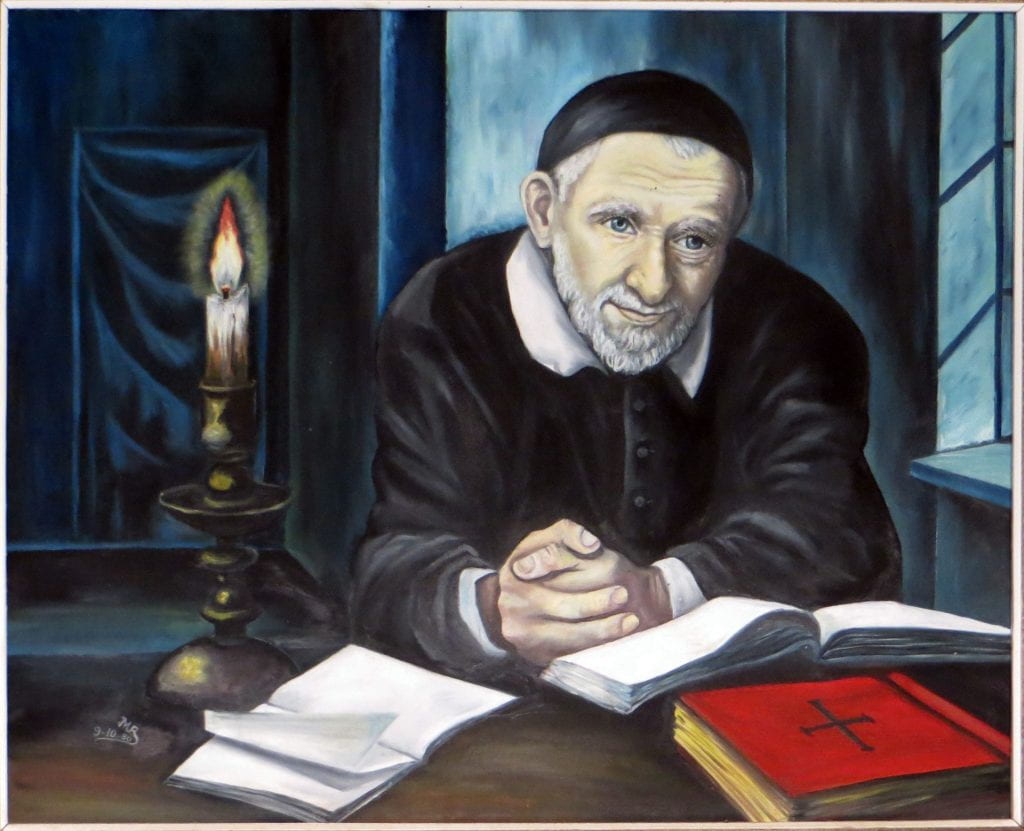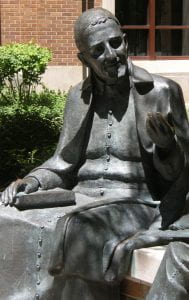
When I left home for college, I had not yet come to appreciate the changing seasons of my rural Connecticut childhood. It would be decades before I was again able to experience a four-season climate. After twenty-plus years in Florida and stops in Texas and California, my partner and I arrived in Pennsylvania, where we were greeted by long winters and the life-affirming color of flowering plants and trees upon the arrival of spring: forsythia, tulips, crocuses, magnolias, and daffodils. By the time we moved to Chicago (and DePaul) in 2012, we had grown quite fond of the changing seasons. Planning and cultivating a garden meant a commitment to hard work, communication, patience, and reward.
We seek such meaning in our lives. And it is sometimes our setbacks—in relationships, in health, in our careers—that call out for renewal. However one finds a source for renewal, one hopes for a spark that might revitalize. When that spark ignites, it can feel like Wordsworth’s daffodils, “fluttering and dancing in the breeze.”[1] Whether embodied by the Easter holiday or the seemingly sudden appearance of brightly colored flowers, spring signals new beginnings, hope, and renewal.
Here we are again in the midst of change. I refer not just to the arrival of spring but also the significant work going on right now on this campus to implement Designing DePaul. I was fortunate to be in the audience for President Manuel’s inauguration speech in November 2022, when he previewed the work that so many in the DePaul community have contributed to. He emboldened those of us in attendance when he said, “We must live up to Saint Vincent and Saint Louise’s standards by being people of action and reflection—not only seeing the dignity of each individual, but also seeing their potential and creating the change that cures.”[2] The change that cures. As a health communication researcher, I am entranced by the word “cure.” Etymologically, the verb form of “cure” stems from the Latin curare, which means “to take care of.” In this sense, we also cure food for preservation. The noun form—cura—is drawn from the same Latin root and is both “a means of healing” and, when accented, “a parish priest in France” and “one responsible for the care of souls”—curé.
As Designing DePaul matures from vision to implementation, our community will recognize how the learning organization is one that is always open to possibility and continuous change. Systems strive for, but never achieve, equilibrium. The change that cures is an organizational mindset that encourages its stakeholders to respond to—indeed, to preserve—the inevitability of perpetual change.
How can we become a community that learns and grows together?
As faculty and staff at DePaul University, we embrace the duty of care we have for our students in fulfillment of our Vincentian mission. In the College of Communication, a small group of us has developed a course, Communication Fundamentals for College Success, to help students become more engaged in their learning, develop a growth mindset, and identify campus resources that can aid them. This collective effort was inspired by significant changes we recognized in our students as they emerged from two years of less-than-ideal learning environments during the pandemic. As committed faculty, we recognized a need, worked together, and made something new for the benefit of our students as well as for each other in our small learning collective.
In her Spiritual Writings, Saint Louise remarks on the work involved in establishing the Daughters of Charity and, in so doing, offers a philosophy for all collaborative work. She writes, “I must make good use of the advice which has been given to me concerning the distinctions which appear among persons working together for the same goal, who have similar and nearly equal responsibilities for its outcome.”[3] Margaret Posig draws connections between Saint Vincent’s change efforts and those of John Kotter, an organizational change scholar. As Posig explains, Saint Vincent and Saint Louise communicated their vision via storytelling in letters, newspapers, and brief memos—all the means of connection at their disposal.[4] Margaret Kelly notes the energy Saint Louise exerted in maintaining her correspondence with Saint Vincent as well as recording her private thoughts.[5] In her writing, she expresses joy and devotion but also her uncertainty, apprehension, and confusion. Arguably, Saint Louise was successful because she embraced humility and patience.[6] Deep learning emerges from an almost childlike curiosity of what can happen when we are both motivated for change—for renewal—and humbled by how much we can learn together.
Questions for Reflection:
To revitalize our work in service of the Vincentian mission and Designing DePaul, how can we inspire conversations that acknowledge both uncertainty and joy? In our various enterprises both within and beyond our professional units, how can we encourage curiosity and humility in the service of change that cures?
“Saint Vincent de Paul as a Leader of Change: The Key Roles of A higher” by Margaret Posig Ph.D.
Reflection by: Jay Baglia, Associate Professor, Health Communication, College of Communication
[1] William Wordsworth, “I Wandered Lonely as a Cloud,” Poetry Foundation, accessed April 11, 2024, https://www.poetryfoundation.org/poems/45521/i-wandered-lonely-as-a-cloud.
[2] Rob Manuel, “Inauguration 2022,” DePaul University, November 11, 2022, https://offices.depaul.edu/president/notes-from-rob/2022-2023/Pages/inauguration-2022.aspx.
[3] Document A. 12, “(Renunciation of Self),” (c. 1633) in Louise Sullivan, D.C., ed. and trans., Spiritual Writings of Louise de Marillac: Correspondence and Thoughts (New York: New City Press, 1991). Available at: https://via.library.depaul.edu/ldm/.
[4] See Margaret Posig, PhD, “Saint Vincent de Paul as a Leader of Change: The Key Roles of A higher Purpose and Empowerment,” Vincentian Heritage 26:1 (2005), pp. 27-41, at: https://via.library.depaul.edu/vhj/vol26/iss1/4.
[5] Margaret J. Kelly, D.C., “The Relationship of Saint Vincent and Saint Louise from Her Perspective,” Vincentian Heritage 11:1 (1990), pp. 77-114, at: https://via.library.depaul.edu/vhj/vol11/iss1/6.
[6] Louise Sullivan, D.C., “Louise de Marillac: A Spiritual Portrait,” in Vincent de Paul and Louise de Marillac: Rules, Conferences, and Writings, ed. F. Ryan and J. Rybolt (New York: Paulist Press, 1995), 39-64.


